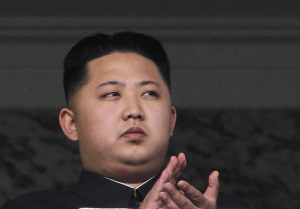Late last month, Kim Jong Un delivered his second policy speech to North Korea’s Supreme People’s Assembly (his first was in April 2019). The speech was very much directed at South Korean President Moon Jae-in, with a mix of hard and soft tactics designed to produce concessions – a familiar North Korean approach.
Kim accused Seoul of “following the U.S.” in conducting joint military exercises with the United States, despite Pyongyang’s repeated calls to halt the maneuvers. Responding to Moon’s call for an end of war declaration in a speech at the United Nations General Assembly in September, the North Korean leader called for the declaration to be preceded by the withdrawal of an “unfair double standard” against North Korea.
North Korea has often used the expression “unfair double standard” recently. It expresses a sense of frustration at the fact that missile tests conducted by North Korea are condemned, yet all the while the U.S. and South Korea are expanding their arsenals. The term is also used in the sense that the “dialogue” that the U.S. and South Korea seek from North Korea is at odds with their “hostile policy.”
Despite criticizing South Korea in his policy speech, Kim announced a restoration of the lines of communication with Seoul “as part of the efforts for realizing the expectations and desire of the entire Korean nation” for recovery and durable peace. This unilateral announcement is an attempt to entice Moon, who has staked his political legacy on an end of war declaration. If South Korea shows flexibility, Kim is likely to have an ace up his sleeve. For example, if Kim’s visit to South Korea – agreed as part of the three-year Inter-Korean summits – actually goes ahead, it will encourage a mood of reconciliation within South Korea even if the visit lacks substance. This will create a favorable environment for any candidate who adopts the reconciliation line in the South Korean presidential election in March 2022.
Since September, North Korea has launched a series of missiles, including a railroad mobile missile and a hypersonic missile. In January 2021, at the 8th Congress of the Workers’ Party of Korea, Kim Jong Un issued a decree for the development of missiles, which has now been implemented. The aim is to steadily boost North Korea’s military capabilities and use this as leverage in negotiations with the U.S. At this point, however, U.S. President Joe Biden is less enthusiastic about the North Korea issue than his predecessor, President Trump.
Kim’s speech dismissed the Biden administration’s offer of dialogue as “no more than a petty trick for hiding its hostile acts.” The distinction in the tone of his messages to South Korea and the United States was very clear.
Kim’s likely goal is to win over Moon Jae-in while distancing himself from the U.S. Alternatively, he may be hoping that the U.S. will be persuaded to compromise with North Korea. With only around seven months left in Moon Jae-in’s term of office, it is clear that North Korea is looking to begin influencing relations with South Korea and the U.S.
Particular attention needs to be paid to the members appointed to the State Affairs Commission announced at the recent Supreme People’s Assembly. The biggest surprise was the selection of Kim Yo Jong, who had been removed as a member of the Central Committee’s Political Bureau in January. While her special status as the younger sister of Kim Jong Un should have obviated the need for her to be given a title, she was named a Member of the State Affairs Commission. Going forward, Kim Yo Jong will not only have responsibility for intraparty business, but will also be the public face for the work of the nation-state.
The State Affairs Commission is headed by Kim Jong Un, who acts as president, with the chairman of the Standing Committee of the Supreme People’s Assembly as first vice-president, the premier as vice-president, and ten ordinary members. Although North Korean diplomacy has been inactive of late, four of the ten members oversee diplomacy and relations with South Korea. Previous members have included the director of the Unified Front Department of the Central Committee Kim Yong Chol, the former director of the International Department Kim Hyong Jun, Foreign Minister Ri Son Gwon, and First Vice Minister of Foreign Affairs Choe Son Hui. Kim Hyong Jun and Choe Son Hui were replaced with director of the International Department Kim Song Nam and Kim Yo Jong. Namely, Kim Yo Jong has replaced Choe Son Hui, who was in charge of the operation of the U.S.-North Korea Summit Meeting with U.S. President Donald Trump.
Despite her official title of Deputy Department Director of the Publicity and Information Department, Kim Yo Jong has attracted attention since March 2020 for her strident condemnations of the U.S. and South Korea. This latest appointment seems to have persuaded the Moon Jae-in administration that North Korea is serious about advancing North-South relations. When North Korea conducted an anti-aircraft missile test the day after the Supreme People’s Assembly, the South Korean government responded calmly. Meanwhile, the South Korean foreign minister has begun to publicly declare the need to ease economic sanctions on North Korea. Moon is seduced by the prospect of legacy building, and the potential reward is too tempting to resist.
As the situation evolves, close attention needs to be paid to whether South Korea will begin using vaccine diplomacy to kickstart stagnant U.S.-North Korea relations. North Korea does not trust Chinese vaccines, while vaccines made in Russia, unlike those from China, do not come free of charge. As such, could North Korea be exploring the possibility of obtaining vaccines from the U.S.?

































